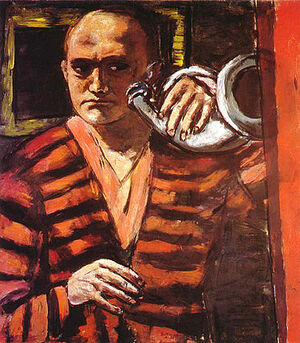Max Beckmann (nonfiction): Difference between revisions
Jump to navigation
Jump to search
No edit summary |
No edit summary |
||
| (16 intermediate revisions by the same user not shown) | |||
| Line 1: | Line 1: | ||
'''Max Beckmann''' (February 12, 1884 – December 27, 1950) was a German painter, draftsman, printmaker, sculptor, and writer. | [[File:Max_Beckmann's_'Self-portrait_with_Horn',_1938-1940.jpg|thumb|Max Beckmann self-portrait.]]'''Max Beckmann''' (February 12, 1884 – December 27, 1950) was a German painter, draftsman, printmaker, sculptor, and writer. | ||
Although he is classified as an Expressionist artist, he rejected both the term and the movement. | Although he is classified as an Expressionist artist, he rejected both the term and the movement. | ||
| Line 7: | Line 5: | ||
In the 1920s, he was associated with the New Objectivity (Neue Sachlichkeit), an outgrowth of Expressionism that opposed its introverted emotionalism. | In the 1920s, he was associated with the New Objectivity (Neue Sachlichkeit), an outgrowth of Expressionism that opposed its introverted emotionalism. | ||
Quotes: | |||
<blockquote>"Height, width, and depth are the three phenomena which I must transfer into one plane to form the abstract surface of the picture, and thus to protect myself from the infinity of space."</blockquote> | |||
And: | |||
<blockquote>"Space, and space again, is the infinite deity which surrounds us and in which we are ourselves contained."</blockquote> | |||
== In the News == | |||
<gallery> | |||
Max_Beckmann_-_Self-portrait_with_quotation.jpg|Self portrait with quote: "Height, width, and depth are the three phenomena which I must transfer into one plane to form the abstract surface of the picture, and thus to protect myself from the infinity of space." | |||
File:Carnival Max-Beckmann.jpg|link=Max Beckmann|Working undercover, [[Max Beckmann|Beckmann]] busts [[Transit drug]] ring in ''Carnival'' (1943). | |||
</gallery> | |||
== Fiction cross reference == | == Fiction cross reference == | ||
* [[Max Beckmann]] | * [[Max Beckmann]] | ||
* [[Gnomon algorithm]] | |||
* [[Gnomon Chronicles]] | |||
== Nonfiction cross reference == | |||
== External links == | == External links == | ||
* [ Post] @ Twitter (12 April 2021) | |||
* [https://twitter.com/GnomonChronicl1/status/1374026384486633481 Post] @ Twitter | |||
* [https://en.wikipedia.org/wiki/Max_Beckmann Max Beckmann] @ Wikipedia | * [https://en.wikipedia.org/wiki/Max_Beckmann Max Beckmann] @ Wikipedia | ||
[[Category:Nonfiction (nonfiction)]] | [[Category:Nonfiction (nonfiction)]] | ||
[[Category:Artists (nonfiction)]] | [[Category:Artists (nonfiction)]] | ||
[[Category:Max Beckmann (nonfiction)]] | |||
[[Category:Painters (nonfiction)]] | |||
[[Category:People (nonfiction)]] | [[Category:People (nonfiction)]] | ||
[[Category:Sculptors (nonfiction)]] | |||
[[Category:Writers (nonfiction)]] | |||
Latest revision as of 18:24, 20 November 2021
Max Beckmann (February 12, 1884 – December 27, 1950) was a German painter, draftsman, printmaker, sculptor, and writer.
Although he is classified as an Expressionist artist, he rejected both the term and the movement.
In the 1920s, he was associated with the New Objectivity (Neue Sachlichkeit), an outgrowth of Expressionism that opposed its introverted emotionalism.
Quotes:
"Height, width, and depth are the three phenomena which I must transfer into one plane to form the abstract surface of the picture, and thus to protect myself from the infinity of space."
And:
"Space, and space again, is the infinite deity which surrounds us and in which we are ourselves contained."
In the News
Working undercover, Beckmann busts Transit drug ring in Carnival (1943).
Fiction cross reference
Nonfiction cross reference
External links
- [ Post] @ Twitter (12 April 2021)
- Post @ Twitter
- Max Beckmann @ Wikipedia


